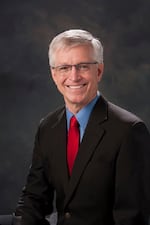A Washington state House candidate who ran in a district using a friend’s address will remain on the primary ballot, despite an official ruling saying he wouldn’t have been an eligible voter there.
On Friday, election officials ruled that “clear and compelling evidence” supported overturning retired airline pilot John Ley’s voter registration at a home in Washington’s 18th Legislative District.
But such a finding does not impact Ley’s candidacy for an open House seat there, Clark County Auditor Greg Kimsey told OPB. Ley remains an active candidate and any votes he receives will be counted.

Republican state representative candidate John Ley
Courtesy of John Ley
“My decision said that the Battle Ground location that Mr. Ley had on his voter registration was not correct,” Kimsey said. When asked if Ley would stay on the ballot and receive votes, Kimsey said yes.
When Ley declared himself a candidate for the seat, he used a voter registration that listed a friend’s Battle Ground address inside the district. Ley, a longtime Camas homeowner, said those friends verbally agreed to let him rent a room for $1 a month.
Washington law requires would-be candidates to be eligible voters for the office they seek. Registering to vote at a new address requires only that a person has lived at the address for 30 days prior to the next election.
After a June 28 hearing, in which Kimsey held a meeting with Ley and Carolyn Crain, the Vancouver resident who challenged Ley’s address, Kimsey found that Ley “did not reside” at the home. The hearing allowed both parties to testify, present evidence and field Kimsey’s questions.
Still, the process had no intention to rule on Ley’s candidacy, Kimsey told OPB. Challenging candidacy must be done through the courts, he said.
“There’s two elements here: one is the status as a registered voter, and the second is as a candidate,” Kimsey said. “The challenge that was held was related to his status as a registered voter. The challenge regarding his status as a candidate would have to be made in front of a Superior Court judge.”
The statement confounded Crain, who expected Ley to be scrubbed from the ballot after her successful challenge. She argued the finding gave Kimsey the authority to disqualify Ley.
“Whatever advice from the legal department he’s getting doesn’t match up with the letter of the law,” Crain said.
State-level officials echo Kimsey that voter registration challenges bear little consequence on candidacy.
“There is no responsibility on the auditor beyond confirming that the voter registration is at an address within the district,” said Randy Bolerjack, a spokesperson for the Washington Secretary of State’s Office.
Bolerjack also noted that any challenge would have been taken to court.

The Washington state Capitol in Olympia.
Austin Jenkins / Northwest News Network
Crain said taking greater legal action may come with its own challenges. If it meant hiring a lawyer, she said, it would be difficult. She said she has to weigh other costs, such as medical costs for her husband, who has cancer.
“You’ve got to start making some tough choices,” Crain said. “If a lawyer were to come along and say, ‘Look, I’ll do the rest pro bono, I’ll file the documents in court, and I’ll show up in court,’ then I’ll give them all the paperwork and groundwork.”
Reached by text message on Friday, Ley said he plans to stay in the race but added he had “some unanswered questions regarding the decision.”
“So I’m not ready to talk about it yet,” Ley wrote.
Ley has not shied from saying he sought the new position as a strategy. He told OPB in May he wanted the seat — and not an open seat in Camas — because it could give him a say on the upcoming $5 billion Interstate 5 Bridge replacement, which he has frequently criticized.
In the interview, Ley could not recall to a reporter when the last time was that he spent a night at his friend’s home in Battle Ground.
Crain, a fellow Republican and a local precinct committee officer, disagreed with Ley’s assertions that his actions were within the law. She said she was motivated to challenge because of a belief in America as a representative form of government.
In the June 28 hearing, Crain testified she visited a Camas home that property records show to belong to Ley and the Battle Ground home. She sent registered letters to both homes, finding the letter sent to the Battle Ground home was signed not by Ley but by one of the homeowners.
Crain also provided financial disclosures that Ley filed to Washington’s Public Disclosure Commission, which oversees political campaigns. Those listed the Camas home.
Ley testified that many times in his life in the military and his career as a commercial pilot, he was registered to vote at a home where he didn’t spend the majority of his time. Ley also gave Kimsey an affidavit signed by the Battle Ground homeowner that he “rented” a room.
When asked why he told OPB that he couldn’t recall the last time he spent the night at the home, Ley told Kimsey he believed the question was “how many times” had he slept there in the last month.
“And I did not recall,” Ley said.
